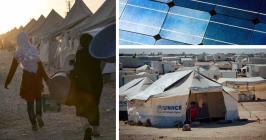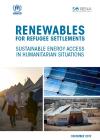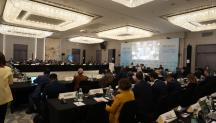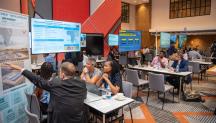

-
-
IRENA (2019), Renewables for refugee settlements: Sustainable energy access in humanitarian situations, International Renewable Energy Agency, Abu Dhabi.
Copied
/-/media/Files/IRENA/Agency/Publication/2019/Dec/IRENA_Refugee_settlements_2019.pdf
Copied
Renewable solutions for refugee settlements
Newsletter
Sustainable energy access in humanitarian situations
Refugees and displaced people mostly depend on energy that is unsustainable and can harm their health and well-being. Sustainable energy based on renewables, in contrast, bridges the gap between humanitarian response and development, enhancing the well-being of displaced people and communities.
This study from the International Renewable Energy Agency (IRENA), prepared in collaboration with the UN Refugee Agency, UNHCR, highlights prime opportunities to strengthen any humanitarian operation. In parallel, IRENA has contributed to UNHCR’s Global Strategy for Sustainable Energy 2019-2024, addressing the need for efficient, clean, affordable and reliable energy in humanitarian situations.
The report assesses four refugee settlements in Iraq and Ethiopia, proposing renewable energy solutions to provide clean, cost-effective and reliable energy to refugees and humanitarian organisations.
Among the findings:
- In Iraq, blackouts and brownouts remain frequent even at grid-connected settlements, leaving refugees and the humanitarian community dependent on expensive, polluting diesel generators.
- In Ethiopia, most refugees lack any reliable access to electric lighting.
- Standalone solar systems with battery banks could cushion the impact of voltage fluctuations on the grid.
- Larger solar parks can supply electricity in and around settlements while providing an enduring asset for host communities.
- Solar mini-grids can boost the efficiency of humanitarian operations, avoid costly diesel consumption, and support first-time refugees with immediate, reliable electricity access.
- Reliable energy access based on renewables spurs socio-economic development and enhances safety, security, productivity and health in refugee settlements.
- The resulting benefits also extend host countries and humanitarian organisations.
Renewable energy offers prime opportunities to strengthen any humanitarian operation. Solutions proposed for refugee settlements in Iraq and Ethiopia could be replicated wherever displaced people need energy access.




